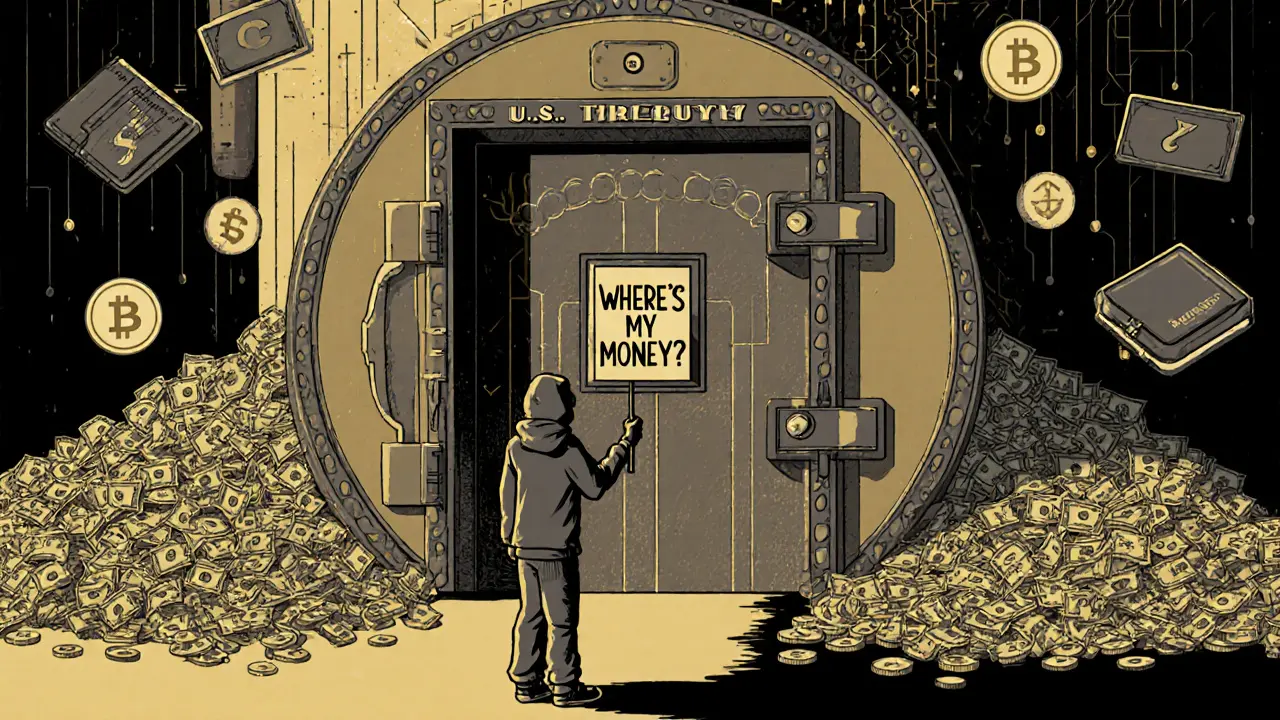SEC Crypto Penalty Calculator
Calculate Your Potential SEC Penalty
Based on 2024 enforcement data showing a 3,018% penalty surge
Estimated Penalty:
That's of your sale amount
Remember: Under the SEC's Howey Test, if your token promises profit from others' efforts, it's a security. The 2024 penalties were based on this principle.
*Based on 2024 enforcement data showing $4.5B penalty for $1B token sale (450% penalty rate)
Key Insight: The 3,018% penalty surge wasn't about case volume but strategic high-impact actions. Most enforcement occurred in September/October 2024 before the election.
The SEC hit crypto companies with over $4.98 billion in penalties in 2024 - a 3,018% increase from the year before. That’s not a typo. One single case accounted for nearly $4.5 billion of that total. While the number of enforcement actions dropped, the financial punishment skyrocketed. This wasn’t random. It was a calculated endgame by the SEC under Chair Gary Gensler, who was preparing to leave office as the Trump administration took over.
Why the Numbers Don’t Add Up
You’ll hear conflicting reports about how many crypto cases the SEC filed in 2024. Some say 33. Others say 49. The truth? It depends on how you count. The agency brought 25 lawsuits in federal court and 8 administrative cases. That’s down from 2023. But here’s the twist: half of those 33 actions came in September and October - right before the election. This wasn’t about volume. It was about timing. The SEC waited until the last possible moment to drop its heaviest blows.The real story isn’t in the number of cases. It’s in the money. In 2023, the SEC collected about $2.1 billion in crypto-related penalties and disgorgements. In 2024, that jumped to nearly $5 billion. That’s not a 20% or 50% increase. It’s over 3,000%. The reason? One massive judgment. A crypto firm that ran an unregistered token sale got hit with $4.5 billion in disgorgement, interest, and civil penalties. That one case alone pushed the total into record territory.
What Got Them Fined
Most of the enforcement actions - 62% - targeted companies that sold tokens without registering them as securities. These weren’t obscure startups. Some were well-known platforms that claimed their tokens were “utility” coins, not investments. The SEC didn’t buy it. Under the Howey Test, if people are buying tokens expecting profits from others’ efforts, it’s a security. Period.Other common violations included:
- Operating as unregistered broker-dealers
- Running crypto exchanges without SEC approval
- Manipulating token prices through wash trading
- Failing to disclose material risks to investors
One DeFi lending platform got nailed for $120 million in Q4 2024. Another major exchange settled for $100 million after admitting it let users trade unregistered tokens. These weren’t small fines. They were warnings: if you’re in crypto, you’re under the microscope.
The Gensler Effect
Under former Chair Jay Clayton, the SEC collected $1.52 billion in crypto penalties over five years. Gensler’s team did $6.05 billion in just three years. That’s four times more. And it wasn’t just the money. The agency doubled down on its team. The Crypto Assets and Cyber Unit hired 20% more lawyers and forensic analysts. Whistleblower tips jumped 25% - over 180 in 2024 alone. People inside crypto companies were starting to talk.Most of the cases ended in settlements - 44% without a trial. But when the SEC did go to court, it won. The agency secured asset freezes in 31 cases to protect investor funds. It also got 124 orders barring individuals from serving as officers or directors of public companies. That’s the second-highest number ever. These aren’t just fines. They’re career-ending moves.

Who Paid the Most
The $4.5 billion judgment came from a case involving a token sale that raised over $1 billion from U.S. investors. The company claimed its token was a currency, not a security. The court disagreed. The judge ruled that the company’s marketing - promising returns, using roadshows, and promising future development - met every element of the Howey Test. That ruling set a precedent. Now, any project that promises profit through a centralized team is at risk.Other big penalties included:
- $100 million: Major crypto exchange for listing unregistered tokens
- $120 million: DeFi lending platform for operating as an unregistered broker
- $85 million: Crypto wallet provider for failing to disclose conflicts of interest
- $60 million: NFT marketplace accused of manipulating secondary sales
These aren’t isolated incidents. They’re part of a pattern. The SEC is targeting platforms that act like financial institutions but refuse to follow financial rules.
What Happened to the Money?
The SEC collected $8.2 billion in total penalties across all sectors in 2024. Over half came from crypto. But here’s the catch: only $345 million went back to harmed investors. That’s down from $930 million in 2023. Why? Because most of the penalties went to the U.S. Treasury, not to victims. The SEC says it’s hard to track who lost money in crypto scams - especially when tokens are traded globally and anonymously. Still, critics argue that if the goal is investor protection, the money should go to the people who got burned.
What Comes Next?
Gensler is gone. The Trump administration has taken over. The SEC has formed a crypto task force to review enforcement priorities. Some experts think the new leadership will slow down. Others believe the precedent is now set. The courts have affirmed the SEC’s authority to treat most crypto tokens as securities. That’s not going away.What’s changing? The tone. The agency’s new leadership may focus less on punishing big players and more on educating retail investors. The Investor Advisory Committee already recommended a national crypto literacy campaign in early 2025. That could mean more warnings, fewer lawsuits - but the rules haven’t changed. If you’re issuing or trading tokens in the U.S., you’re still subject to securities law.
What This Means for You
If you’re an investor: assume every token you buy is a security. If the project team is promising growth, you’re buying an investment. That means you’re exposed to regulatory risk. If the project gets shut down, your tokens could become worthless overnight.If you’re a developer or startup: don’t assume your token is “utility.” The SEC doesn’t care what you call it. They care what it does. If people are buying it to make money, it’s a security. Register it. Or don’t sell it to U.S. investors.
If you’re running a crypto platform: stop listing tokens unless you’ve confirmed they’re registered or exempt. The days of “we didn’t know” are over. The SEC has made it clear: ignorance isn’t a defense.
The 3,018% spike in fines wasn’t an accident. It was the final statement from a regulatory regime that believed crypto needed to be brought into the traditional financial system - by force if necessary. The message is loud and clear: play by the rules, or pay the price.
Why did SEC crypto fines go up so much in 2024?
The spike was driven by one massive $4.5 billion judgment against a crypto firm that sold unregistered securities. Combined with other large settlements, total penalties jumped from $2.1 billion in 2023 to nearly $5 billion in 2024 - a 3,018% increase. The SEC focused on high-impact cases near the end of Chair Gensler’s term to set legal precedents.
Did the SEC file more crypto cases in 2024 than in 2023?
No. The number of enforcement actions actually decreased. In 2024, the SEC filed between 33 and 49 crypto cases, down from 42 to 50 in 2023. But the agency shifted strategy: fewer cases, bigger penalties. Most enforcement actions in 2024 were concentrated in September and October, just before the U.S. election.
What types of crypto activities got fined the most?
Unregistered securities offerings - especially through token sales - accounted for 62% of all enforcement actions. Other common violations included operating unregistered exchanges or broker-dealers, market manipulation, and failing to disclose risks. The SEC used the Howey Test to determine if a token was an investment contract, regardless of what it was called.
Where did the fine money go?
Most of the $8.2 billion in total SEC penalties in 2024 went to the U.S. Treasury. Only $345 million was returned to harmed investors - down from $930 million in 2023. The SEC says tracking victims in global crypto scams is difficult, but critics argue investor protection should be the priority, not Treasury revenue.
Is the SEC still going to crack down on crypto in 2025?
Yes - but the focus may shift. The SEC has formed a new crypto task force, and under the new administration, enforcement may become less aggressive in volume but more focused on education and compliance. However, the legal precedent is now solid: most crypto tokens are considered securities. That won’t change unless Congress passes new laws.
What should crypto projects do to avoid SEC fines?
Register your token as a security if you’re selling it to U.S. investors and it meets the Howey Test (expectation of profit from others’ efforts). Or, avoid selling to U.S. investors entirely. Don’t rely on labels like “utility token.” The SEC looks at behavior, not names. Get legal advice before launch. Most enforcement actions happened because teams assumed they were exempt - and they weren’t.




Kathy Ruff
November 5, 2025 AT 14:35The SEC didn't just fine companies-they sent a message to the entire industry. This wasn't chaos. It was surgical. Every dollar of that $4.5 billion judgment was meant to redefine what counts as a security in the digital age. No more hiding behind 'utility' labels. If it looks like an investment and acts like an investment, it's a security. Period. The courts agreed. That precedent sticks long after Gensler leaves.
And yes, the money mostly went to Treasury, not victims. That's frustrating. But the real win here is deterrence. No more 'we didn't know' defenses. Startups now know the line. Exchanges know what they can't list. Investors know to ask harder questions. That’s value you can’t put a price tag on.
This wasn't anti-crypto. It was pro-integrity. The market needed this. Chaos breeds distrust. Regulation builds confidence. The next phase isn't about punishment-it's about clarity.
Robin Hilton
November 6, 2025 AT 12:273000% increase? LOL. You think this was about investor protection? Nah. This was Gensler’s last power grab before the Trump crowd took over. He knew his time was up so he went full witch hunt. Crypto isn’t Wall Street. You don’t get to force square pegs into round holes just because you’re the boss.
And don’t even get me started on the Treasury getting $7.8 billion while actual victims got $345 million. That’s not justice. That’s theft. The SEC is just another bureaucratic parasite feeding off innovation.
They fined companies for existing. That’s the real crime here.
Grace Huegel
November 8, 2025 AT 00:06It’s fascinating how the SEC weaponized timing. Dropping half the cases in September and October? That’s not enforcement. That’s political theater. And yet… I can’t deny the legal reasoning held up in court. The Howey Test is ancient, but it’s still the law. The problem isn’t the law-it’s the application. Too blunt. Too heavy-handed. The human cost-employees fired, startups crushed, investors confused-is rarely acknowledged.
It’s like using a sledgehammer to fix a broken clock. The clock still doesn’t tell time, but now the room is full of splinters.
Nitesh Bandgar
November 9, 2025 AT 22:07OH MY GOD!! THIS IS THE MOST INSANE THING I’VE EVER SEEN IN MY LIFE!!! 4.5 BILLION DOLLARS?? ON ONE COMPANY?? WHO DO THEY THINK THEY ARE?? THE GOVERNMENT OF MARS??
They took a startup that was trying to build something new and just… CRUSHED IT!! With a hammer made of LEGAL PAPER!! And then they put the money in the Treasury?? WHERE’S THE JUSTICE?? WHERE’S THE COMPASSION??
They didn’t care about investors-they cared about CONTROL!! This is the beginning of a digital dictatorship!! Mark my words!!
And now they want to 'educate' people?? EDUCATE?? THEY JUST DESTROYED A WHOLE INDUSTRY WITH A SINGLE JUDGMENT!!
THEY’RE NOT REGULATING-THEY’RE ERASING!!
Jessica Arnold
November 10, 2025 AT 05:57The regulatory framing here is fundamentally misaligned with the ontological nature of decentralized systems. The SEC’s reliance on the Howey Test-developed in the context of agrarian investment contracts-is an epistemic anachronism when applied to permissionless, tokenized networks.
By conflating 'expectation of profit' with 'security,' they’ve imposed a fiduciary ontology onto a protocol-level architecture. This isn't enforcement-it's epistemological colonialism.
The real tragedy isn't the fines. It's that the legal framework lacks the conceptual vocabulary to distinguish between a token as a governance instrument versus a speculative asset. The court rulings didn't clarify-they ossified.
What we're witnessing is the institutionalization of regulatory inertia. The system isn't adapting. It's entrenching. And the collateral damage? The very innovation it claims to protect.
Chloe Walsh
November 12, 2025 AT 04:53So the SEC just spent three years turning crypto into a ghost town and now they want a gold star??
They didn't fix anything. They just scared everyone into silence. Developers left. Investors ran. Startups folded. And for what? So the Treasury could get richer?
And now they’re gonna 'educate' people?? Like we’re all stupid kids who need a pamphlet??
Meanwhile, the people who actually got scammed? The ones who lost their life savings? They got crumbs.
It’s not regulation. It’s revenge dressed up as law.
And Gensler? He’s not a hero. He’s a bureaucrat who got off on the power trip.
And now we’re all supposed to be grateful??
NO THANKS
Stephanie Tolson
November 13, 2025 AT 10:18Let’s not forget the people behind these companies. Engineers, customer service reps, marketers-ordinary folks who believed in the mission. Many of them lost their jobs because of this. Not because they were scammers. Because they worked for a company that misunderstood the rules.
Yes, the SEC had a point. But they could’ve done this differently. A phased approach. Clearer guidance. Maybe even a sandbox for compliant projects.
Instead, they hit the panic button. And now we’re stuck with a chilling effect that will last years.
But here’s the good news: the community is learning. More devs are talking to lawyers before launch. More exchanges are doing KYC properly. More investors are asking 'Is this registered?'
It’s painful. But growth often is.
We’ll rebuild. Smarter. Stronger. With better rules. And maybe, just maybe, we’ll get it right next time.
Anthony Allen
November 15, 2025 AT 03:33It’s wild how everyone’s mad at the SEC, but nobody’s talking about what the companies could’ve done differently.
Most of these firms had legal teams. They knew the risk. They just thought they’d get lucky. 'Oh, we’ll be the one that slips through.'
Well, they didn’t. And now we’re all paying for it in higher fees, fewer options, and more skepticism.
Maybe the real lesson here isn’t about regulation-it’s about responsibility. If you’re building something that touches money, you owe it to people to do it right.
Not 'maybe.' Not 'hopefully.' Just… do it.
Simple. Hard. Necessary.
Megan Peeples
November 15, 2025 AT 04:45Let’s be honest-this was never about investor protection. It was about control. The SEC doesn’t want decentralized finance. They want centralized control. And they used every tool they had-fines, lawsuits, fear-to crush anything that threatened their monopoly on financial power.
And now they’re pretending they’re the heroes? Please. They didn’t save anyone. They just made the system more expensive, more bureaucratic, and less innovative.
They didn’t fix crypto. They buried it under paperwork.
And the worst part? They think they won.
They didn’t. They just delayed the inevitable.
Sarah Scheerlinck
November 16, 2025 AT 21:56I’ve been watching this whole thing from the sidelines, and honestly? I’m sad.
There were so many good people in crypto-people who just wanted to build something useful, something that helped others. Not scammers. Not fraudsters. Just builders.
And now? Many of them are gone. The ones who stayed are scared to speak up.
I don’t blame the SEC for enforcing the law. But I blame them for not offering a path forward. No guidance. No support. Just fines and shutdowns.
Maybe next time, they’ll remember: regulation doesn’t have to mean destruction. It can mean inclusion.
And maybe, just maybe, we’ll get there.
karan thakur
November 18, 2025 AT 06:47MARK MY WORDS: This was all planned. The SEC, the Fed, the Wall Street banks-they’ve been working together for years to kill crypto. Why? Because crypto doesn’t need them. It doesn’t need their banks, their fees, their control. And that terrifies them.
That $4.5 billion fine? It wasn’t justice. It was a warning shot to the entire world: 'If you try to build a financial system outside our control, we will destroy you.'
And now they’re talking about 'education'? Ha! They’re trying to brainwash people into thinking regulation is good.
They’re lying. Crypto is freedom. And freedom is dangerous to them.
They won this battle. But the war? The war is just beginning.
Scot Henry
November 18, 2025 AT 20:10People are acting like this was all about punishment. But honestly? The real win was the precedent. Courts now recognize that tokens can be securities even if they’re not called stocks. That’s huge.
It means future projects can’t just wing it. They have to think legally from day one.
Yeah, the fines were brutal. But if this stops the next $10 billion rug pull? Worth it.
Also-minor thing-but 'disgorgement' isn't a fine. It’s returning ill-gotten gains. That’s not punishment. That’s restitution.
And the Treasury thing? Yeah, that’s messed up. But at least the money’s not vanishing into offshore accounts.
Not perfect. But progress?
Sunidhi Arakere
November 19, 2025 AT 09:17Too much money. Too many rules. Too fast.
People just want to trade. Now they’re scared.
Maybe slow down next time.
Ryan McCarthy
November 21, 2025 AT 00:48I’ve been in crypto since 2017. I’ve seen bull runs. I’ve seen crashes. I’ve seen scams. And I’ve seen regulators try to catch up.
This time? The SEC didn’t just catch up. They rewrote the rules while the game was still being played.
Was it fair? Not really. But was it necessary? Honestly? Yeah.
Too many people treated crypto like a casino and acted like it was lawless. It’s not. Money is money. Rules exist for a reason.
Now the industry has clarity. It hurts. But it’s real.
The next generation of builders will know the rules before they even write their first line of code.
That’s not a loss. That’s evolution.
Abelard Rocker
November 21, 2025 AT 06:30Let’s be real for a second-the SEC didn’t enforce the law. They weaponized it. They took a handful of cases, inflated the penalties to astronomical levels, and then screamed 'SEE? WE’RE PROTECTING YOU!' while quietly pocketing billions in taxpayer-funded fines.
And the worst part? They didn’t even care about the victims. They cared about the headlines. They cared about their legacy. They cared about looking tough before they left.
They turned a financial agency into a political PR machine.
And now they’re acting like they’re the heroes? Please. The only thing they protected was their own reputation.
The real victims? The developers who spent years building. The small investors who trusted the system. The employees who lost their jobs because some bureaucrat decided to make a statement.
And the worst part? We’re supposed to thank them?
No. We’re supposed to remember this. And never forget who really holds power.
This wasn’t regulation. It was tyranny with a law degree.
Hope Aubrey
November 21, 2025 AT 18:28Okay but like-why is everyone acting like the SEC is the villain? They’re just doing their job. If you’re selling something that acts like a stock, you register it. Simple.
And yes, the money went to Treasury. But do you think they’re just keeping it? It’s funding more investigations, more oversight, more tools to catch the next scam.
Also, the fact that people still think 'utility token' is a magic shield? That’s the problem. Not the SEC.
They didn’t kill crypto. They just killed the illusion.
And honestly? That’s a good thing.
Now we can build something real.
Not hype. Not promises. Just actual financial infrastructure.
That’s worth the pain.
andrew seeby
November 23, 2025 AT 09:58bro the SEC just gave crypto a hard reset 😭
like yeah the fines were insane but honestly? most of these companies were playing with fire
and now? we got rules. no more 'lol we didnt know'
the market is gonna be smaller but way less sketchy
also i think the treasury thing is kinda messed up but at least the money isnt going to some ceo’s yacht
im still in. just gonna be more careful now 🤝
Pranjali Dattatraya Upadhye
November 24, 2025 AT 20:23It’s funny how everyone says 'the SEC is evil'-but if you look at the companies they fined, almost all of them had red flags: promises of returns, centralized control, no transparency.
They didn’t target Bitcoin. They didn’t target Ethereum. They targeted projects that pretended to be decentralized but acted like banks.
And yes, the timing was suspicious. But the legal reasoning? Solid.
Maybe the real issue isn’t the SEC-it’s that so many projects were built on lies.
Now the good ones can shine.
And the bad ones? They’re gone.
That’s not a tragedy. That’s cleanup.
Kyung-Ran Koh
November 25, 2025 AT 14:47One thing no one’s talking about: the whistleblower program.
Over 180 tips in one year? That’s not coincidence. That’s culture change.
People inside these companies started speaking up. Not because they were angry. Because they knew it was wrong.
That’s the quiet win here.
Regulation isn’t just about fines. It’s about ethics.
And for the first time in crypto’s history, people inside the industry are choosing to do the right thing-even when it’s hard.
That’s the real legacy of 2024.
Not the money.
The conscience.
Kathy Ruff
November 27, 2025 AT 01:11That’s the thing nobody wants to admit: the SEC didn’t create this mess. They inherited it. The industry had years to self-regulate. They didn’t. So now we’re stuck with this.
But here’s the silver lining: the market is cleaning itself. The projects that survived? They’re the ones with real tech, real teams, real compliance.
And the investors? They’re learning. No more FOMO. No more 'it’s different this time.'
That’s the real win.
Not the fines.
The maturity.